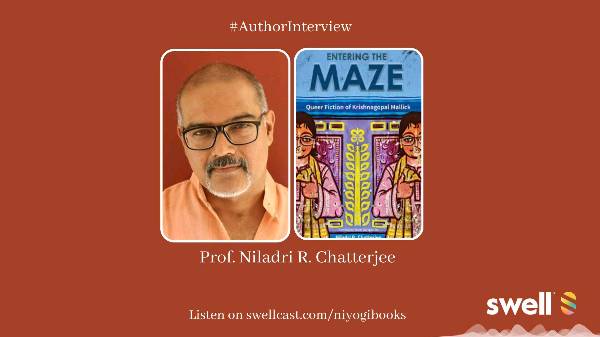
@niyogibooks
Established in 2004, in Delhi, we are an independent publishing house with more than 600 titles—and the list continues to grow.
Entering the Maze : Niladri R. Chatterjee on the Queer Fiction of Krishnagopal Mallick
Published by Niyogi Books. Entering the Maze is a book that celebrates queer fiction from Bengal and has been curated and translated from the works of writer Krishna Gopal Mallick by Professor Niladri R. Chatterjee. The book brings together two short stories and one novel penned by Mallick to the English reading audience, taking them into the streets of Kolkata of earlier times when life moved at a much gentler pace while keeping a focus on hidden aspects of daily life

Niladri Chatterjee
@bookfan · 4:42
And when I did, I was quite astounded, not only by the fact that he was talking about his sexuality in such frank terms, but I was also struck by the fact that there was no sense of guilt and trauma and anguish and suffering, which is something that I actually think most of us expect from LGBTQ narratives. We expect the queer person to suffer a lot and to go through a lot of anguish
Swell Team
@Swell · 0:15

Niladri Chatterjee
@bookfan · 2:18
I've I've read all of his short stories and I've read most of his essays, but there are a couple of novels that I think I still need to go through to be absolutely sure that there is no queer content in them either. But of the books that I read and the material that I read, these three, the two short stories and that novella seemed to me to be the queer rest of them all
So the fact that Mallick has chosen to go with an author surrogate who is also called Krishnagopal Mallick, makes the interpretation of his work a bit tricky. And I think you have mentioned this in the introduction yourself. So did the events that unfold in his stories really happen? Did he really indulge in such risky escapedes back at a time when they would have landed him on the wrong side of the law? And did he face any negative backlash for his work?

Niladri Chatterjee
@bookfan · 4:56
And he says very clearly that it was entirely based on his life. He was being very truthful. But while we can accept that that is what it is, we are also left with a little bit of a doubt as to how truthful this is. Because later on in another novel or is it actually it's probably the one that comes before. He mentions the fact that there are these number of men who he had relationships with. And he goes back to his college days
Thank you so much for that. I will leave you with one final question. With more authors choosing homosexual themes for their work, a samesex story no longer remains taboo for Indian writers. However, the ones that are available are mostly limited to specific experiences and do not quite reflect the diverse experience of queer lives in our country. So, from your perspective, how has LGBTQIA literature in regional languages evolved over the last decade?

Niladri Chatterjee
@bookfan · 4:50
And I think what will happen in the future is that there will be more people who will not only write about themselves, but who will also write about people that they know very intimately, who they know as having various sexual experiences that are not strictly heteronormative, having genders that cannot be neatly tagged as male or female. And I think these narratives are going to emerge as time goes on. And as the publishers also understand that there is a certain readership that is ready for this

